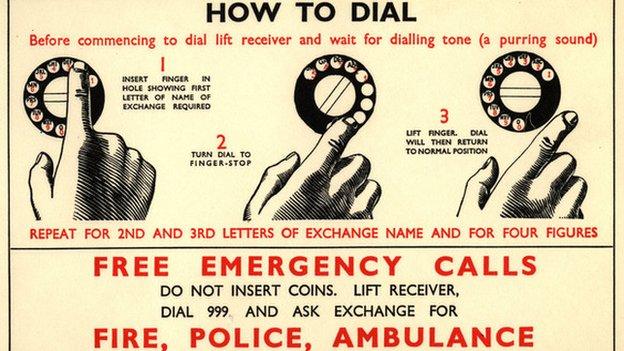999 'time wasters': Where do emergency services draw the line?
- Published
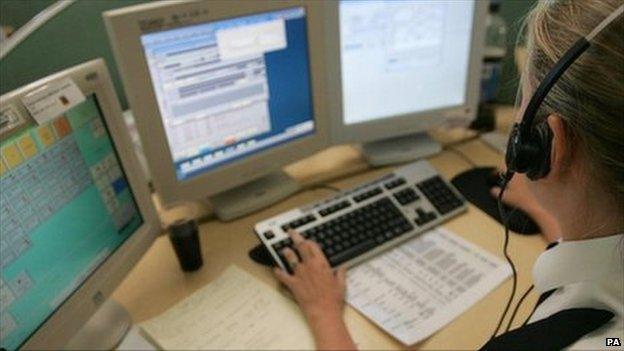
Police regularly release recordings of "silly" 999 calls in a bid to highlight the problem of time wasting
With cash strapped and resources tight, emergency services are trying to cut nonsense 999 calls - but how do they stop some callers wasting their time?
Inappropriate calls to 999 in recent years have ranged from a man who called police to complain about a prostitute's looks to a woman who wanted to know if the green part of a potato was poisonous.
In many cases, most people would see it as common sense that calls like those should not be made to a phone number dedicated to emergencies.
A recent example, however, shows it is not all black and white.
On 5 July, a 15-year-old girl became trapped in a cat flap. She had returned home in the early hours of the morning without her house keys and so tried to squeeze herself through - but got stuck.
She called West Midlands Fire Service to ask them to free her.
Caller (disguised voice): "Basically she has misdescribed herself, misrepresented herself totally"
The service has been charging for non-emergency calls for the past two years because it says its increasingly-stretched resources must be focused on savings lives, and not being called out to things such as lock-outs.
But this ill-fated flap foray did not see the girl charged as the service's fire control decided, if there had been a fire while she was still stuck, her life would have been at risk.
So where do emergency services draw the line?
Lancashire Fire and Rescue Service said it would consider a charge for call-outs in which there was "some element of culpability, rather than a mishap".
A spokesperson explained: "If a lorry shed its load because it was poorly strapped on, we would exact a charge from a haulier on the grounds it used resources at public expense and it was avoidable.
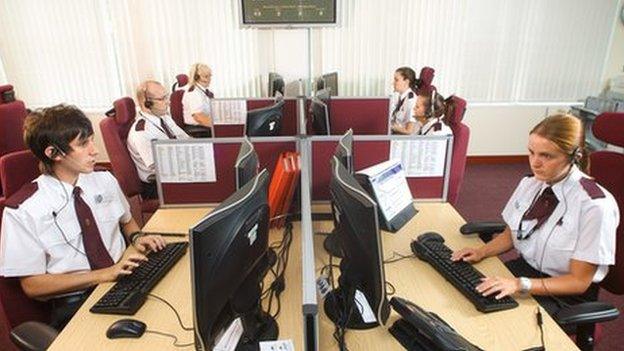
Calls to 999 fell in the West Midlands after the force did a 24-hour 999 tweetathon
"It depends on the detail of the incident if we charge or not. There's variation nationally on this."
The emergency services often release details of time-wasting calls they receive in a bid to urge people to think twice before calling 999.
Police Scotland was among a number of forces to do so when the 101 non-emergency number was launched. One caller rang 999 to complain he had been given a hamburger instead of a cheeseburger at a fast food restaurant.
Other forces to have taken a similar approach include the West Midlands, which revealed one recording of a woman complaining about the sprinkles on her ice cream cone. Greater Manchester Police also revealed "silly prank calls" including reports of marmalade theft and a chicken walking down a road.
The un-named woman called 999 to complain about the placement of sprinkles on her ice cream
As a result of the publicity in the West Midlands, calls to 101 grew by more than 2,000 a day and those to 999 fell by nearly 500, the force said.
The Metropolitan Police - the largest UK police force - also ran a similar campaign last December. It said it had received 2,060 fewer misuse or hoax calls in the first six months of this year than the 28,872 such calls it received in the same period last year as a result.
Some of the calls are made by the same people, ringing 999 over and over again.
Det Supt Gurdip Singh, from the Met's command and control, said: "The most frequent nuisance callers are looked at each day, with officers focusing on the top 10 in each London borough and making prosecutions where appropriate.
"Operators are trained to recognise misuse and hoax calls. They are also trained to recognise where callers may suffer from mental health or vulnerability issues.
West Midlands Police take a 999 call from a woman who needs help with her laptop
"Where mental health issues are the catalyst, work is undertaken with the local Safer Neighbourhood Teams and other relevant partner agencies to provide help for the individual and deter them from constantly calling police."
Social psychology professor Michael Moore said well-trained listeners, such as operators in 999 call centres, often know how to pick up the signs of deliberate timewasters.
'Anti-establishment attitude'
"There might be someone who is making these calls intentionally to harass emergency services because they want to clog the lines or whatever," he said.
"Well-trained listeners are trained to differentiate these things - what needs to be taken seriously and what should be set aside."
He said there could be a range of reasons for people deciding to call 999 to waste time.
"There's a touch of anti-establishment attitude to making fake or hoax calls," said Prof Moore.
"It may even be a bored person or someone who has done it as a dare to impress a friend.
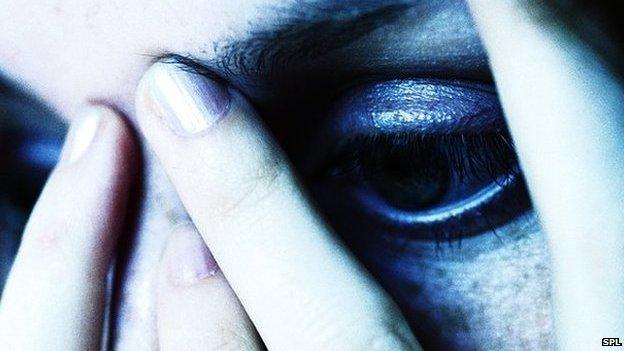
The majority of frequent callers to West Midlands Ambulance Service last year had complex mental disorders
"The callers might also suffer from psychopathology - some 5% of the population is depressive for example and every second person has some kind of neurosis."
The West Midlands Ambulance Service said callers with complex mental disorders accounted for the vast majority of its frequent callers in the past financial year.
Rob Cole, head of clinical practice at the service, said: "We were managing 232 frequent callers in the past 12 months - genuinely vexatious fewer than 10 - most with complex issues that simply need managing by different approaches.
"Several hundred are calling more than 10 times per month.
"We are now getting involvement from many agencies whether within or outside of the safeguarding area."
For those few callers who make repeated bogus calls, the service says it will pursue prosecutions, as well as "acceptable behaviour agreements" - which normally precede anti-social behaviour orders.
Among those prosecuted was Anil Gautan, 28, from Church Road in Bradmore, Wolverhampton, who was jailed for 12 weeks in February after he plagued the 111 medical helpline with 5,000 bogus calls between August and November last year, claiming to be ill.
Mr Cole said: "We have had a handful of prosecutions and there are approximately 20 agreements in existence."
The Welsh Ambulance Service put together a list of the top 10 frequent callers in each of the seven local health boards it covers, in a bid to reduce demand by involving other agencies.
That exercise flagged up more than 50 calls in 2013 from one address in Cardiff and Vale at which an alcohol dependent patient had recurrent falls.
The man was given an urgent hospital appointment with a consultant, which led to rehabilitation, and has since made no calls to the service.
Richard Lee, head of clinical services for the services and a paramedic, said: "That was a real win for everyone.
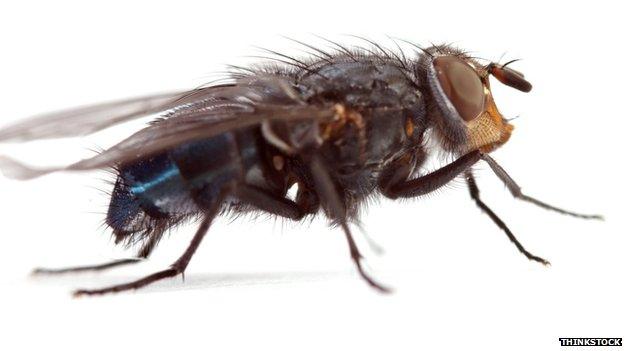
A man called 999 from Milford Haven to say he had a fly in his ear
"Once a frequent caller is on our radar, we can work with their GP to agree an individual treatment plan."
He said the same thinking was being applied to frequent callers with mental health disorders, involving other agencies.
"We're the ambulance service, we're not great at providing complex, mental health interventions," he said.
"We are trying to change things so we have a better offering for mental health patients but also have ambulances free for people who have a serious road accident, heart attack or stroke."
There is still concern that people dialling 999 for minor conditions - including colds and toothache - are putting the lives of genuine emergency patients at risk.
But emergency services hope public education initiatives, such as the NHS's Choose Well campaign and the release of examples of inappropriate calls, will help underline the message - 999 is for emergencies.
- Published22 July 2014
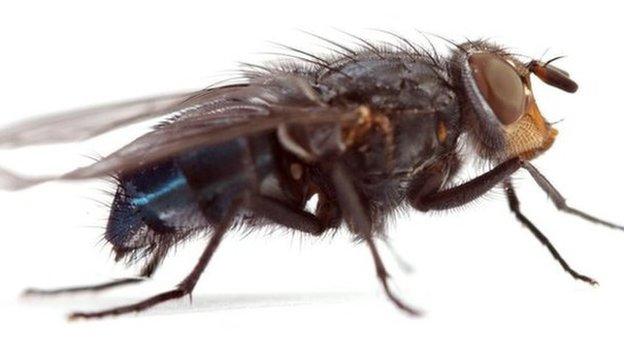
- Published6 November 2013
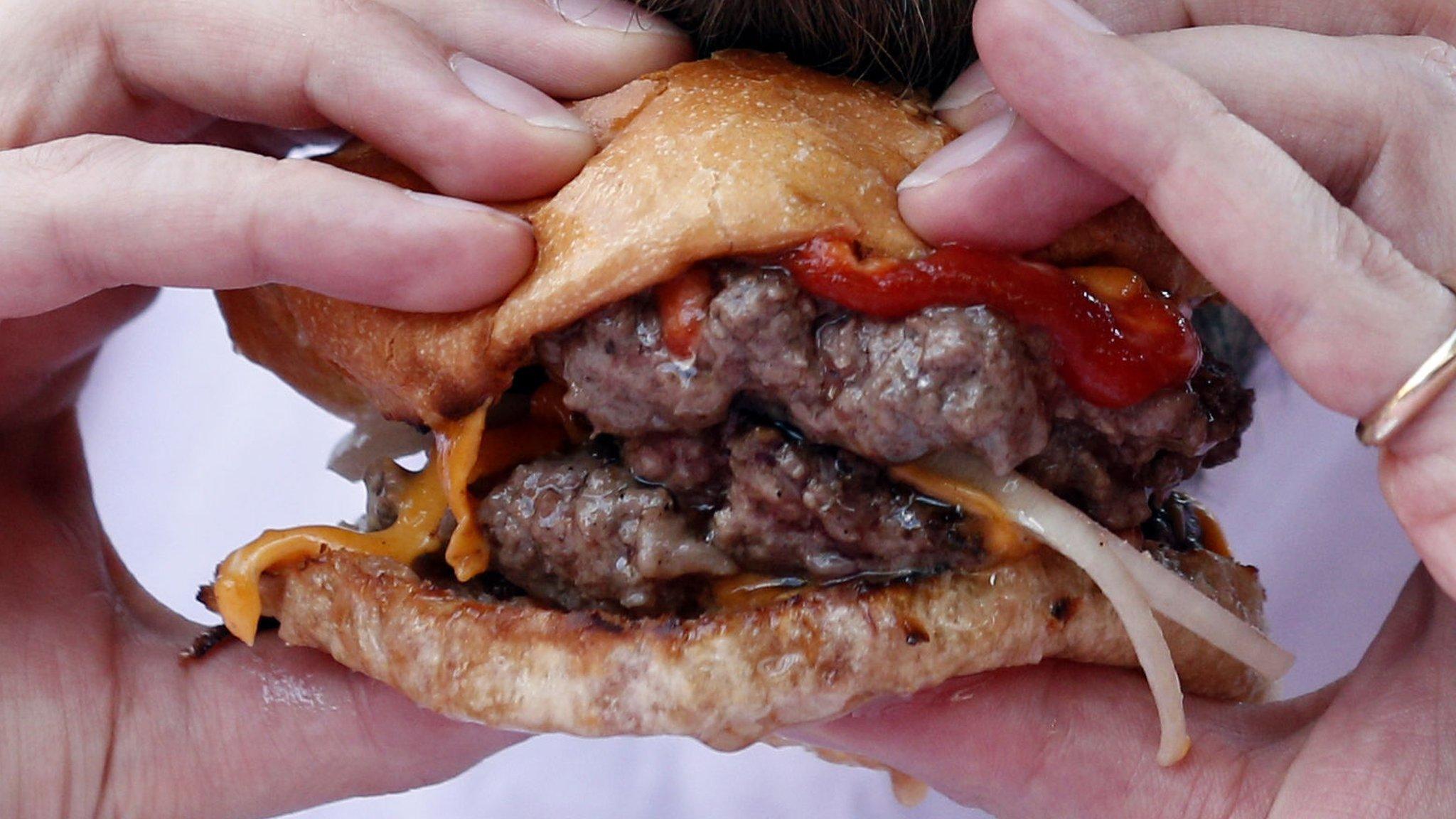
- Published28 December 2012
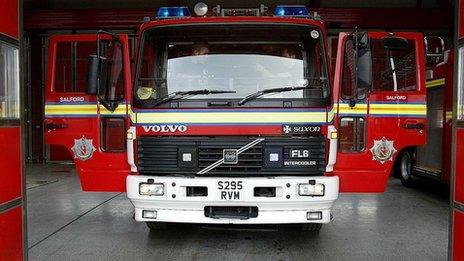
- Published2 February 2013
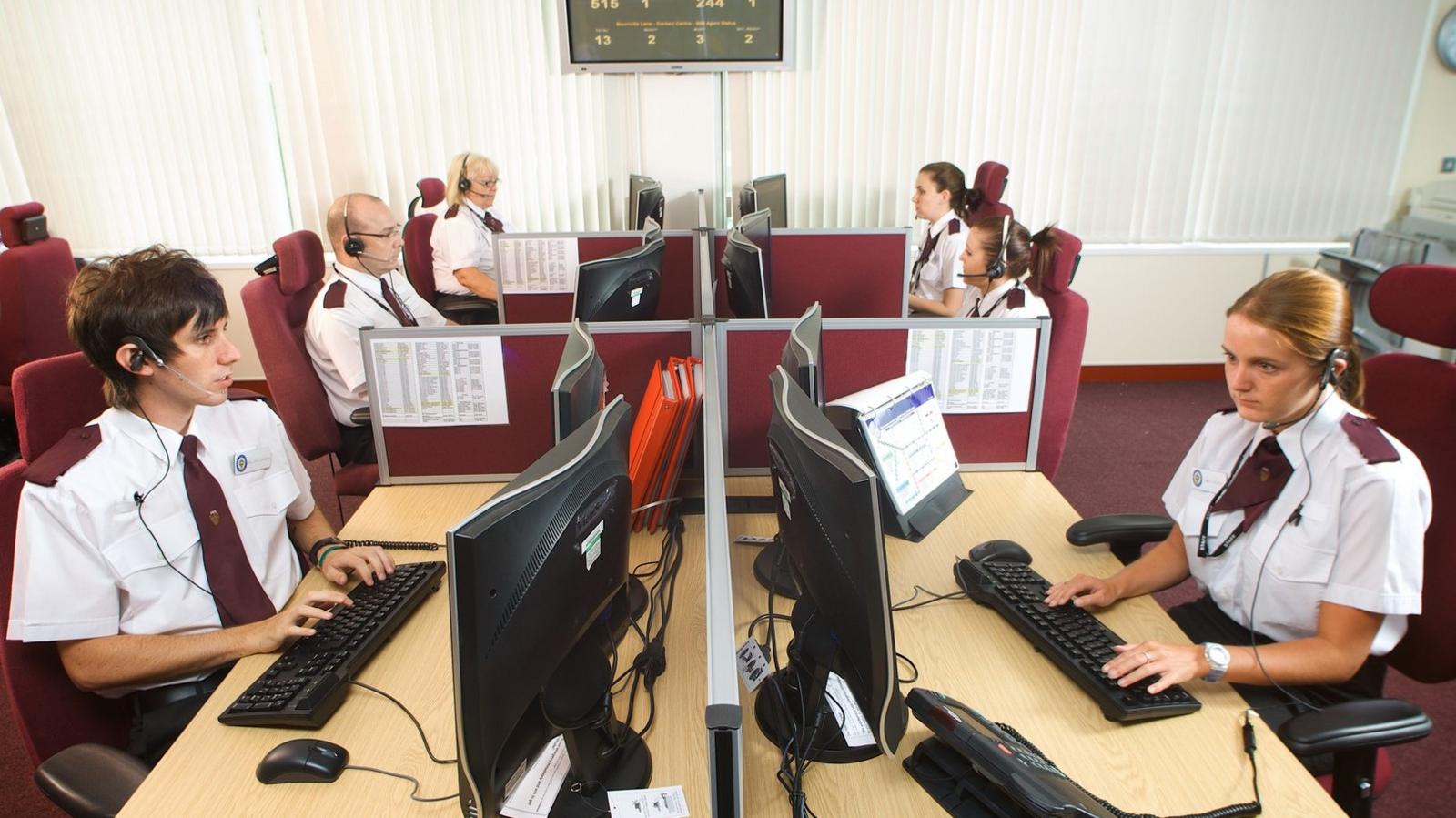
- Published28 December 2012
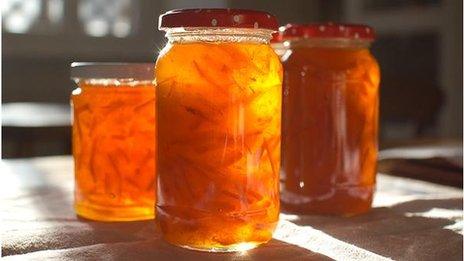
- Published18 March 2014
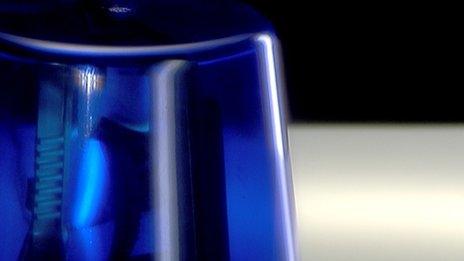
- Published6 May 2014
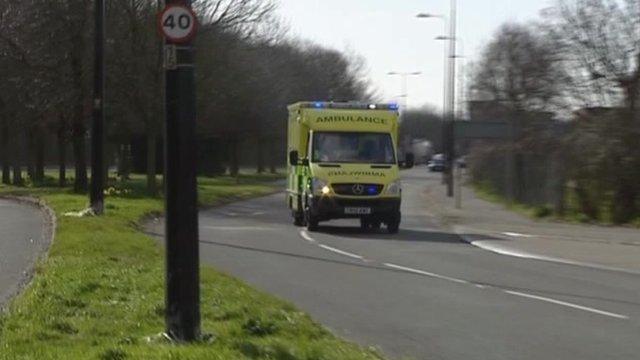
- Published14 May 2012
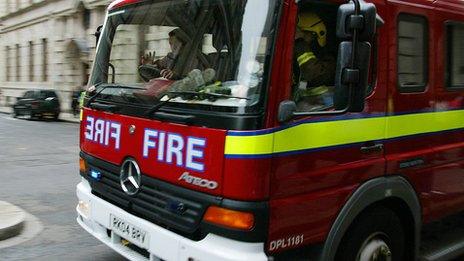
- Published23 December 2011
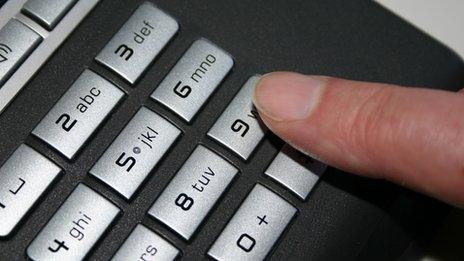
- Published30 June 2012
